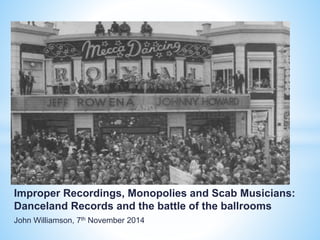
Danceland 051114
- 1. Improper Recordings, Monopolies and Scab Musicians: Danceland Records and the battle of the ballrooms John Williamson, 7th November 2014
- 2. * *Context – the British music profession post Second World War *Danceland Records – history and how it operated *The Musicians’ Union’s (MU) response to Danceland *The wider significance of Danceland – copyright, live performance and restrictive practices
- 3. * *No records could be “played, used or performed, or permitted to be played. . .at any theatre, music hall, dance hall or other place of entertainment where: * there was “a trade dispute directly affecting the rights or interests of musicians” *In complete or partial substitution for musicians employed *Where musicians could, having regard to the size and nature of the theatre, music hall, dance hall or other place of entertainment, be employed” (MU Executive Committee, Report to Conference 1947: 23)
- 4. * *To produce records which will: *“require no licence from any dictatorial or monopolistic body” *“be in the correct tempo” *“embody all ballroom and teaching needs” and *“can be played in public, as desired, without the need of making any returns” (Musicians’ Union, BBC and Recording Committee minutes, 13th August 1948)
- 5. *
- 6. *
- 7. *
- 8. *
- 9. *
- 10. * *MU’s fight was on 3 fronts: *To protect legal status of their agreement with PPL *Against Mecca (and others) who saw recordings as replacement for live musicians * To retain considerable power over the record industry and broadcasters *1988 – MMC report forces PPL to withdraw “all requirements for the employment of musicians from its licensing conditions” *MU moderated its stance on opposition to recordings for pragmatic reasons *Power shift in 1980s – pro-business and anti-Union. Mecca/ Danceland a forerunner of that.
